Thomaston Rideshare Accident Lawyer
Do you need a Thomaston rideshare accident lawyer? If you or a loved one has been involved in an accident with an Uber, Lyft, or rideshare driver—whether as a passenger, another driver, or even a pedestrian—you have rights. Understanding these rights and navigating the complexities of rideshare accident claims requires the help of an experienced attorney. At Etemi Law, we are dedicated to helping victims of rideshare accidents receive the compensation they deserve.
Call us today at (203) 409-8424 for a


The Reality of Rideshare Accidents
Uber and Lyft have revolutionized transportation, providing millions of rides daily across the U.S. However, with the rise of these services, the number of rideshare-related accidents has also increased. Research from Rice University and the University of Chicago suggests that ridesharing services have contributed to a 2-3% increase in U.S. traffic fatalities since 2011, leading to up to 1,100 deaths annually.
Common Causes of Rideshare Accidents
Uber and Lyft drivers often operate under challenging conditions, increasing their risk of accidents. Some of the most common causes include:
- Distracted Driving – Relying on GPS, accepting ride requests, and managing passengers can divert a driver’s attention.
- Driver Fatigue – Many rideshare drivers work long hours or multiple jobs, leading to drowsy driving.
- Unfamiliar Routes – Navigating new areas can cause sudden stops or erratic driving behavior.
- Poor Vehicle Maintenance – Rideshare drivers are responsible for keeping their vehicles in good working condition, but lapses can lead to preventable accidents.
Connecticut Rideshare Laws and Regulations
Connecticut has strict laws governing rideshare companies and their drivers. These include:
- Mandatory Background Checks – Uber and Lyft must conduct background checks on all drivers, including a criminal record and driving history review.
- Vehicle Safety Requirements – Vehicles must pass inspections and meet specific safety criteria.
- Insurance Coverage – Rideshare companies must provide at least $1 million in liability coverage when drivers are transporting passengers.
- Driver Hour Limits – Uber and Lyft drivers can work a maximum of 14 consecutive hours and 16 hours in a 24-hour period to prevent fatigue-related accidents.
Who is Liable in a Rideshare Accident?
Determining liability in an Uber or Lyft accident can be complex, as multiple insurance policies may be involved. Our legal team at Etemi Law will investigate your case to establish liability and maximize your compensation.
If Another Driver is At Fault
- The at-fault driver’s insurance is the first line of compensation.
- If the at-fault driver is uninsured or underinsured, Uber/Lyft’s uninsured motorist coverage may apply.
If the Rideshare Driver is At Fault
- If the driver was logged into the app and waiting for a ride request, Uber/Lyft provides $50,000 per person/$100,000 per accident in bodily injury coverage.
- If the driver was transporting a passenger, Uber/Lyft provides $1 million in liability coverage.
- If the driver was off duty, their personal auto insurance applies.
Why You Need a Thomaston Uber and Lyft Accident Lawyer
Rideshare accident cases involve multiple insurance companies and complicated liability issues. Insurance companies often try to minimize payouts, but with an experienced attorney from Etemi Law, you can fight for the full compensation you deserve.
Our legal team will: ✅ Investigate the accident thoroughly ✅ Obtain key evidence, including rideshare records and driver logs ✅ Negotiate aggressively with insurance companies ✅ Take your case to court if necessary
Contact Etemi Law Today
If you or a loved one has been injured in an Uber or Lyft accident, don’t wait. Protect your rights and get the compensation you deserve. Contact Etemi Law today for a free consultation.
📞 Call us at (203) 409-8424 💻 Visit us online to schedule your case review
Winter turns routine rides in Thomaston into tense logistics. Black ice on Route 8 northbound ramps and leaf-slick stretches along Main Street make curbside pickups and drop-offs more hazardous, especially in pre-dawn commutes and thaw cycles. Rideshare drivers pulled from neighboring towns often confront narrow, unplowed shoulders, producing low-speed crashes, soft-tissue injuries and sudden ambulance calls that expose gaps in local winter response.
Those calls often route through Thomaston Volunteer Ambulance, where crews describe delayed scene times when plows are still working neighborhood turns. Riders with hip fractures, concussions or frostbite need stabilization, warm transport and quick imaging; when weather slows ground crews, initial rideshare movement to a warmed car can complicate triage. My reporting finds frequent requests for interfacility transfer when advanced imaging or orthopedics are only available farther away.
Regional receiving patterns show Waterbury Hospital and other nearby centers absorbing many winter crash patients from Thomaston, with CT scans and orthopedic consults dictating next steps. When small-town ambulances hand off to hospital teams, beds, imaging slots and even snow-delayed ambulances shape whether a patient goes directly to imaging, to short inpatient observation, or to arranged transport out of county for specialist care.
Black Rock State Park and its icy trailheads create predictable weekend spikes in rideshare pickups — hikers and snowshoers looking for a return ride after an afternoon scramble. When drivers misjudge icy lots or when leaf-runoff freezes, we see more fractures and soft-tissue injuries that start in a rideshare vehicle and continue through ambulance stabilization, interfacility transfer and weeks of outpatient rehab, stressing families and local coordination.
